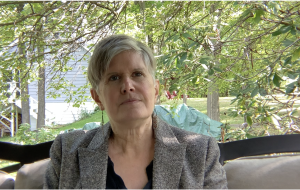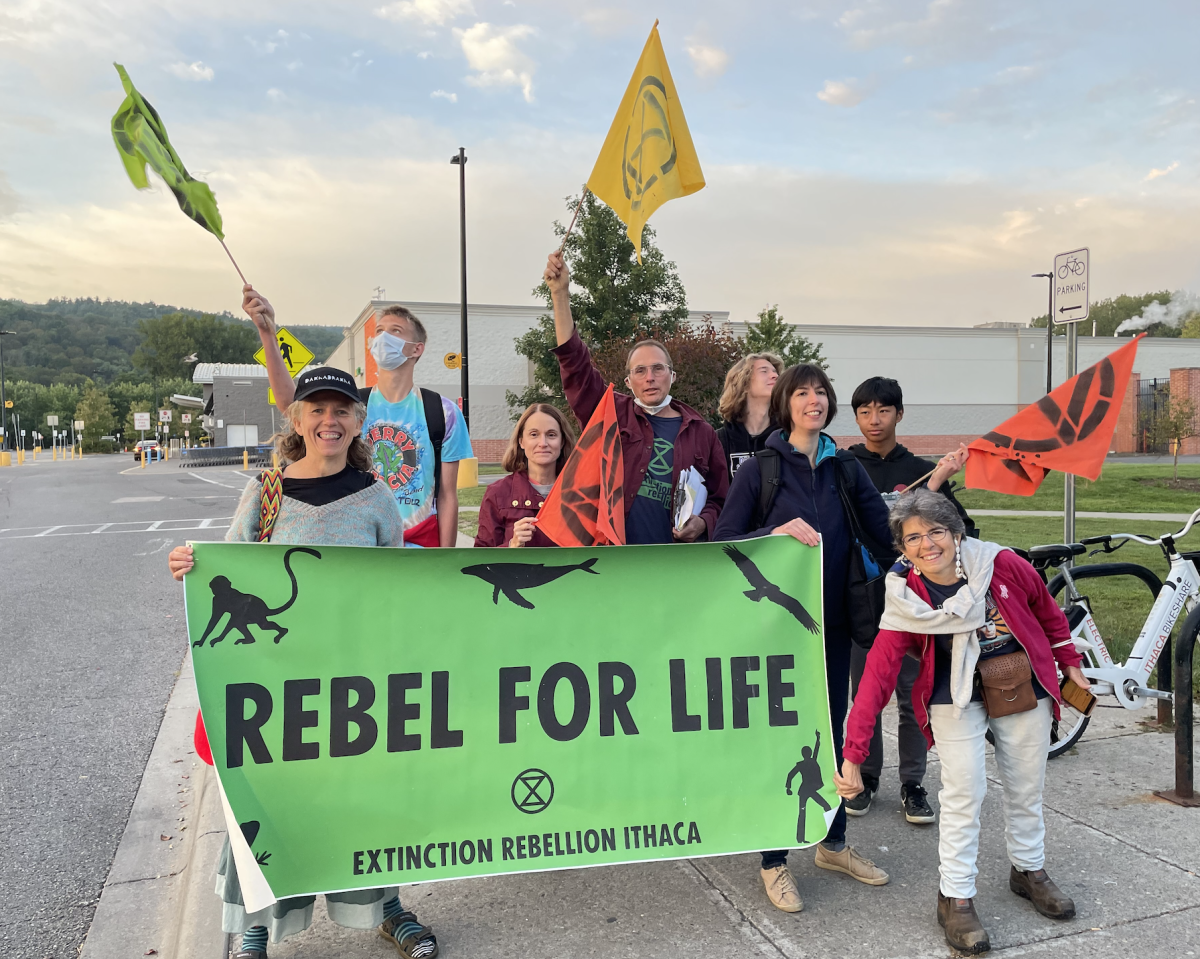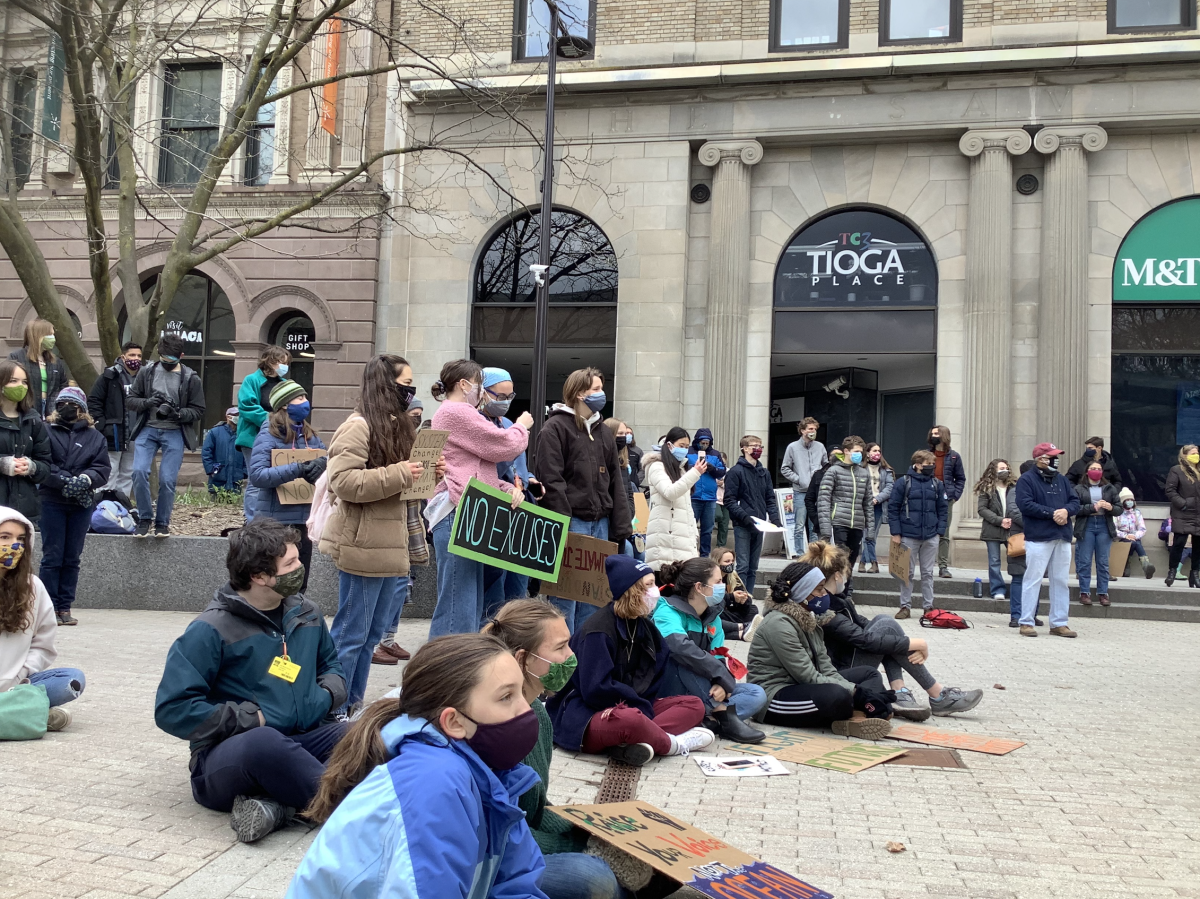Climate change is driven largely by the use of fossil fuels and as the world warms and countries continue to fall short of climate goals, activists are increasing protest efforts to make themselves heard.
On September 17, 2023, over 75,000 people participated in the March to End Fossil Fuels in New York City, calling for President Biden to declare a climate emergency, stop oil and gas projects, and phase out drilling projects. Members of the Ithaca community attended the march which took place ahead of Climate Week and the 2023 United Nations Climate Ambition Summit, to demand action.
Climate change impacts
According to the Paris Agreement, the world needs to keep the increase in the global average temperature to below 2 degrees Celsius above pre-industrial levels and pursue efforts “to limit the temperature increase to 1.5 degrees Celsius above pre-industrial levels.” A report published last month, coordinated by the World Meteorological Organization, said that the planet is “far off track from meeting its climate goals” including getting all carbon emissions close to net zero by 2050.
July 2023 was likely the globe’s warmest month on record as the National Oceanic and Atmospheric Association found the average global surface temperature to be 2.02 degrees Fahrenheit (1.12 degrees Celsius) above average making it the warmest in NOAA’s 174-year record.
Scientists urge Biden to take stronger stance against fossil fuels
A letter facilitated by advocacy group Food and Water Watch had almost 400 signatures from scientists around the world endorsing the demands of protesters at the march.
Sandra Steingraber, senior scientist at the Science and Environmental Health Network and former scholar-in-residence at Ithaca College, and Robert Howarth, David R. Atkinson Professor of Ecology & Environmental Biology at Cornell University, were two of the original eight signers of the letter.

Howarth said that Biden declaring a climate emergency, which was one of the letter’s four demands, would send a signal that this is an important issue and could free up federal funding.
“I’ve been doing research and teaching on climate change for over 40 years. And going back 30 or 40 years ago I certainly believed humans were on a path to change the climate and we should do something about it but it was still somewhat of an abstraction even to me,” Howarth said. “Today it’s not an abstraction. We really are running out of time to make corrections.”
Steingraber marched with hundreds of scientists who wore their white lab coats in the protest and said that as a scientist she feels it’s her duty to take action when publishing research and talking about the data isn’t spurring enough action.
In December, Steingraber will be speaking about science and activism in a talk at the American Geophysical Union’s “Wide. Open. Science.” conference titled: “Scientists as Civil Disobedients: When Speaking Truth to Power Doesn’t Work.”
“By taking those actions [protesting] I’m objectively letting the world know how bad it is,” Steingraber said. … “I’m joining together with other people trying to fully embrace my role as a biologist working in the public interest to signal that we must act on this and if speaking calmly and bringing you the data isn’t triggering action then I’ll choose another method.”
While fossil fuels are not the only contributor to climate change, Howarth said that anyone in the field would say that at least two-thirds and up to 80 to 85% of climate change is driven by fossil fuels.
“My own analysis will put it between 72 to 75%,” Howarth said. “Agriculture is the next biggest and what we do with our waste and forest management are others, but they are important at a 25% level.”
The biggest source of greenhouse gas emissions In New York state comes from heating homes and businesses. Howarth said electrifying buildings across the state and country is crucial to help move away from fossil fuels.
In November 2021, the City of Ithaca announced plans to decarbonize 6,000 buildings by 2030. If this project is successful, it could be a case study for other cities to follow, but Howarth said the upfront cost of switching to energy-efficient heat pumps can be as expensive as $25,000. Even though the cost will pay itself off over time with energy savings, government funding to subsidize or fully pay for the change is needed Howarth said.
Ithacans travel to NYC
A bus of over 50 Ithacans and people from the surrounding area spanning from high schoolers to retirees left from Ithaca to take part in the march. Claire Nickell organized the bus and said that she felt participating in the protest was important.
“Things are scary with the climate and if you’re paying attention, it’s really terrifying,” Nickell said. “For me, one of the only antidotes to that terror or just shutting down is to do something. I have a ten-year-old son and what got me into activism is in 20 years when he asks me, ‘What did you do mom?’ What will I be able to say? So that’s why [I’m marching today].”

Leila Wilmers, postdoctoral associate in the Department of Sociology at Cornell University, was also marching and she spoke about her worries for her three-year-old daughter’s future.
“I see a really bleak future,” Wilmers said. “So I think it’s really important ahead of big meetings of world leaders … to show that we feel very strongly about this. For people to go from all over the country to this, to travel and take their time to do this in large numbers, I think it can send a strong message.”

Steingraber was a leader of the anti-fracking movement in New York State that led for former governor Andrew Cuomo banning hydraulic fracturing in 2014. She said that the past success of that movement keeps her hopeful for the future.
“Everyone told us it was hopeless,” Steingraber said. “We used science and activism to convince the governor to ban it and we won. … You make your own hope. Hope comes through action.



















